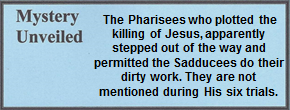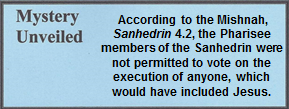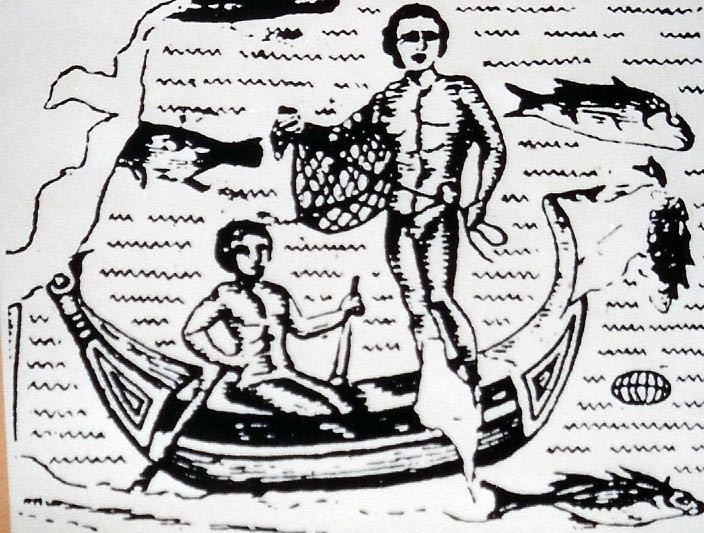15.02.09 Lk. 22:52-53; Jn. 18:12; Mt. 26:56b; Mk. 14:51-52
JESUS CHIDES ARREST
Lk. 52 Then Jesus said to the chief priests, temple police, and the elders who had come for Him, “Have you come out with swords and clubs as if I were a criminal? 53 Every day while I was with you in the temple complex, you never laid a hand on Me. But this is your hour — and the dominion of darkness.”
Jn. 12 Then the company of soldiers, the commander, and the Jewish temple police arrested Jesus and tied Him up.
Mt. 56b Then all the disciples deserted Him and ran away.
Mk. 51 Now a certain young man, having a linen cloth wrapped around his naked body, was following Him. They caught hold of him, 52 but he left the linen cloth behind and ran away naked.
“The chief priests.” It appears that the leading Pharisees handed the issue of Jesus over to the chief priests because there is no mention of the Pharisees in connection to His arrest, the six trials, and the crucifixion. From this point on, they are out of the biblical record and the Sadducees apparently took control of the crucifixion process.

The complete absence of the Pharisees is altogether highly probable according to Josephus, who recorded a previous historic event that is similar to this account. As the story goes, evidently, Jonathan, a member of the Sadducees, desired to punish a certain Eleazar by capital punishment, but the Pharisees extended mercy and chose a lesser punishment. According to Josephus, the discussion concluded as follows:
So the Pharisees made answer, that he deserved stripes and bonds (scourging and chained to prison columns) but that it did not seem right to punish reproaches with death; and indeed the Pharisees, even upon other occasions, are not apt to be severe in punishments.
Josephus, Antiquities 13.10.6 (249b)
The Sadducees, on the other hand, were known for their stern and heartless cruelty, even toward their own peers who served as priests.[1] Josephus said they were hated by the people.[2] These elitists were so bad, that shortly before the destruction of the temple; they stole the tithes that were reserved for the other priests, thereby forcing them into starvation. Josephus recorded the horrific account.
About this time king Agrippa gave the high priesthood to Ishmael, who was the son of Fabi. And now there arose a sedition between the high priests and the principal men of the multitude of Jerusalem…. And such was the impudence and boldness that had seized on the high priests, that they had the hardness to send their servants into the threshing floors to take away those tithes that were due to the priests, insomuch that it so fell out that the poorer sort of priests died of want. To this degree did the violence of the seditious prevail over all right and justice.
Josephus, Antiquities 20.8.8 (179, 181)
However, the greatest probability for the reason that the leading Pharisees are not mentioned in the trial of Jesus is that they were not permitted to vote in capital cases.[3] The Mishnah preserves this portion of the Oral Law:
In non-capital cases concerning uncleanness and cleanness (the judges declare their opinion) beginning with the eldest, but in capital cases they begin from (them that sit at) the side. All (of the family stocks) are qualified to try non-capital cases; but all are not qualified to try capital cases, but only priests, Levites, and Israelites that may give (their daughters) in marriage into the priestly stock (can try capital cases).[4]
Mishnah, Sanhedrin 4.2[5]
As much as the Pharisees had planned to kill Jesus, when the hour came to do the act they were forced to allow the Sadducees to act out the intentions of their heart. They might have been before Pilate shouting, “Crucify him, crucify him” (Mt. 27:22-23; Lk. 23:20), and felt innocent about it, since they were not physically involved in His death or judicially involved. In their way of thinking, they were innocent, since murder to them was not a condition of the heart, but only of a completed action.

Throughout the centuries, the Pharisees have been accused of the crucifixion of Jesus. Clearly, they plotted His death numerous times, yet, from the time His arrest, trial, condemnation, and crucifixion, they appear to be nowhere in the gospel narratives. They vanished from the pen of the gospel writers to be replaced by the Sadducees, scribes, and elders. Could it be that they passionately coveted His death, but also feared the actual execution of a man who did good and performed miracles? In comparison with other judicial decisions by the Pharisees and Sadducees, the Pharisees often demonstrated more compassion than did their rivals. While the Pharisees most certainly desired to rid themselves of Jesus, they did not want to be directly involved with His execution. As strange as it seems, this was consistent with their legalistic thinking. As previously stated, they believed that if they were not physically involved in His death, they were not guilty of any sin, regardless of their attitudes.
Amazingly, while Jesus was taken through the Jewish and Roman courts, the disciples were never taken into custody. It is a mystery that not a single one of them was asked to come forward and testify on behalf or against Jesus; neither were they accused of being “co-conspirators.” If the Romans would have had the slightest thought that Jesus was a political revolutionary, He and all the disciples would have been slaughtered immediately. But the disciples remained safe and were not even asked to appear in court.
“Have you come out with swords and clubs as if I were a criminal?” Some translations read, “Am I leading a rebellion?” The implication of the political background is that criminals were generally also revolutionaries, because they supported themselves by criminal activities. There were thirteen rebellions between the time when Pompey entered Jerusalem in 63 B.C., and when the temple was destroyed in A.D. 70. Some historians say there were three major revolts that overshadowed dozens of smaller ones. But on this evening, the Romans were not worried about any attempt by Jesus to overthrow them. The Herodian spies kept Herod Antipas and Pilate well informed of their activities. As previously stated, Jesus was so extremely popular (Mk. 12:37) that they continued to fear an uprising would occur if His arrest became public knowledge. Hence, the soldiers were sent as an additional measure of security and insure the peace.
“Every day I was with you in the temple complex.” Jesus emphatically stated that He was teaching daily in the temple courts. It was the custom of the day for rabbis and sages to teach in this manner throughout the temple courts or on the Southern Steps. Jesus said that He was simply following the custom of His peers; He did absolutely nothing unusual or His enemies could have challenged Him in broad daylight. Instead, they chose to do their evil work in the darkness of night. Jesus remained extremely popular with the crowds throughout the Passion Week. The reason He was not arrested in the temple courts is that the masses would have revolted against the arresting forces. Those who claim that all the people turned against Jesus have failed to provide any type of evidence or suggestion as to why thousands of people, who loved Jesus, would have suddenly turned against Him.
“A linen cloth.” Some scholars believe the word linen is a derivation from Indian. India was the primary source for the finest fabrics. Furthermore, it is believed that Indian cloth was used to wrap dead bodies and possibly the body of Jesus as well.[6]
15.02.09.Q1 Concerning Mark 14:52, was a certain young man who ran away really naked?
This is a classic example where the definition of a word in one culture has a different meaning in another culture. In verse 52 are the phrases, “a certain young man … ran away naked.” Nearly all commentators agree that this young man was none other than John Mark, who in later years wrote one of the gospels. The arrest of Jesus not only frightened the disciples, but did so especially for John Mark. Evidently someone tried to capture him, but he slipped out of his outer garment and escaped. To be without the outer garment was deemed naked.[7] The English word naked is translated from the Greek root word dyo. It is closely linked with gymnotes. To have been naked was to have been without an outer garment but wearing loin cloth, or poorly dressed,[8] a completely different definition from modern Western understanding of the word. On a side note, military definition of naked was to be without armor, not without clothing.[9] The disciples knew all too well that the arrest of a leader usually meant imprisonment, slavery, or possibly execution for everyone affiliated with him. John Mark was not about to take any chances. An explanation of the word “nude” is found in this rabbinic writing concerning the capital punishment of stoning:
When he (the condemned man)[10] was four cubits from the place of stoning, they stripped off his clothes. A man is kept covered in the front and a woman both in front and behind….The sages say: “A man is stoned naked but a woman is not stoned naked.”
Mishnah, Sanhedrin 6.3-4
Clearly, both men and women wore minimal clothing when stoned to death, but were still considered to be “naked.” As previously stated, modesty in the ancient Jewish world was of great importance. When the Greeks and Romans controlled Judaea, the Jews were horrified with the immodesty of their Gentile overlords and neighbors. That is one reason they called Gentiles “dogs.”

15.02.09.A. AN OLD ILLUSTRATION OF TWO MEN FISHING “NAKED.” Fishing “naked” did not mean fishing without any clothing, but fishing in what would today be known as “underwear” or a small “swim suit.” Since fishing was done at night in the middle of the Sea, it was not an issue. Furthermore, hauling fishing nets into a boat usually meant the fishermen got rather wet.
A person’s garments always consisted of an under layer and outer or upper layer. As previously stated, when the outer layer was removed, he/she was said to be “naked.” [11] In this narrative, Isaiah took off his outer layer that was known as a cetoneth and sandals and preached repentance to the people. He obviously caught their attention, and probably their criticisms, but he told them of pending divine judgment. On the other hand, if one were to say today that Isaiah preached in his underwear, that interpretation is both right and wrong. It is right from the ancient Jewish account, but again wrong in western thinking because “ancient under-garments” were far more modest than today’s fashions. Since Isaiah was dressed as one who had been robbed or a prisoner of war, he personally became an object lesson of his sermon.[12]
[1]. Geikie, The Life and Words of Christ. 2:71-72.
[2]. Josephus, Antiquities 18.1.3-4.
[3]. For further study, see James C. McRuer, The Trial of Jesus. Toronto: Clarke Irwin Ltd. 1964.
[4]. Last parenthesis mine.
[5]. Other parenthesis by Danby, ed., Mishnah.
[6]. See also Mt. 27:59; Mk. 15:46; Lk. 23:53; Vincent, Word Studies in the New Testament. 1:228.
[7]. Lang, Know the Words of Jesus. 57.
[8]. Weigelt, “Clothe, Naked, Dress, Garment, Cloth.” 1:312, 315; Vine, “Naked, Nakedness.” Vine’s Complete Expository Dictionary. 2:425.
[9]. Josephus, Antiquities 8.14.2
[10]. Parenthesis mine.
[11]. Vine, “Naked, Nakedness.” Vine’s Complete Expository Dictionary. 2:425, and “Clothing, Cloths, Clothes, Cloke, Coat.” 2:105-06.
[12]. Keil and Delitzsch. Commentary on the Old Testament. 7:242.